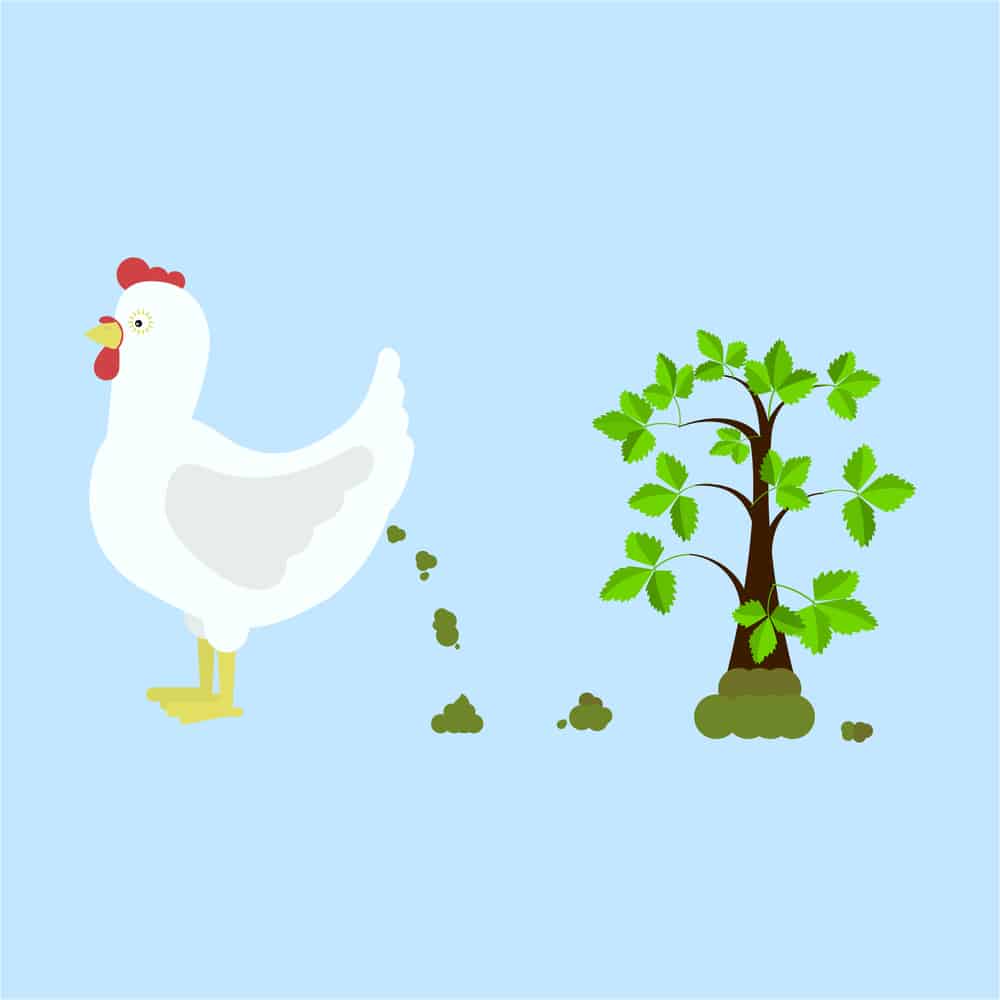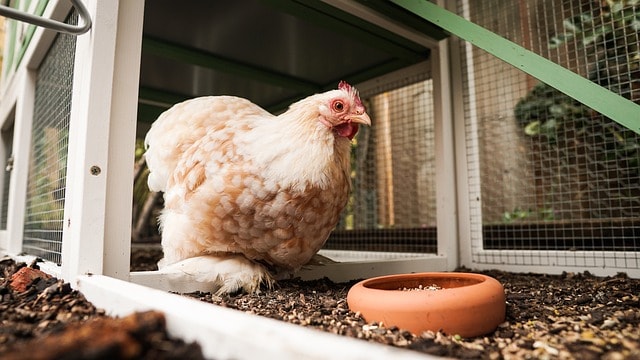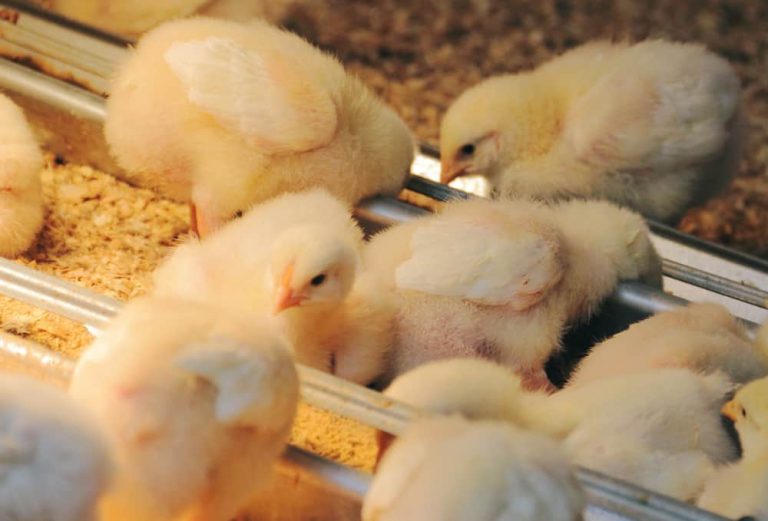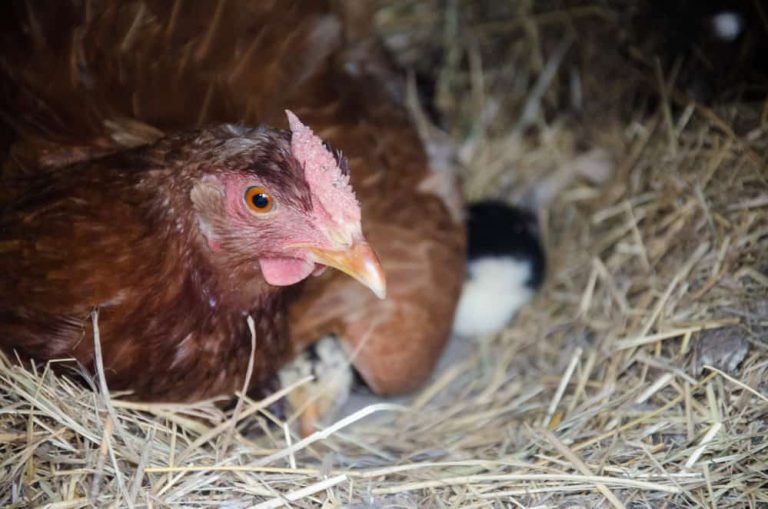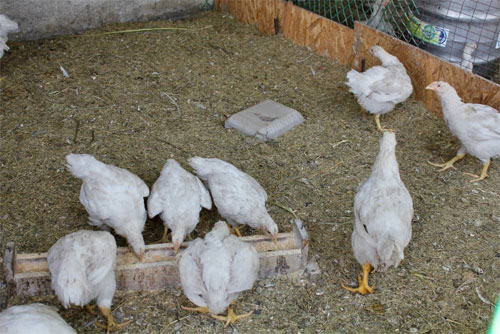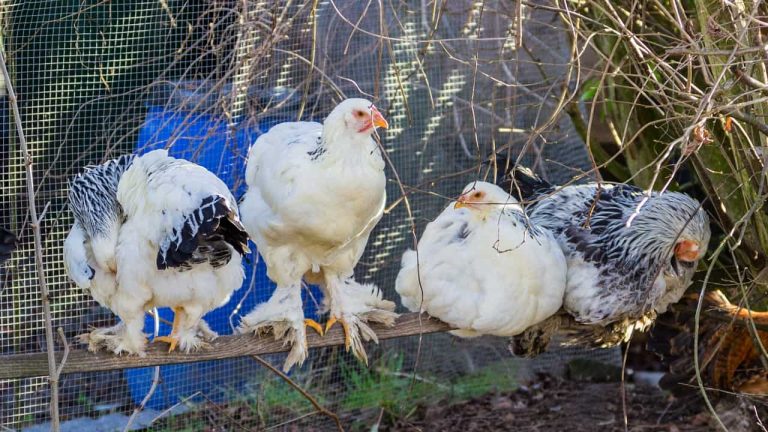If you’ve never raised chickens before and you’re only at the beginning of your journey, you’re probably looking to keep them as healthy as possible.
Well, a good way of making sure that your chickens live a long life and lay enough eggs would be to keep an eye on their poop.
The way their poop looks has a lot to say about their health status, whether it reveals that they’ve eaten something bad, they’re dehydrated, or they have worms.
Without further ado, here is everything you should know about chicken poop.
Contents
Normal chicken poop
Your chickens’ poop looks a little different from human poop, for example, or that of any other animal. It’s not uncommon for people to see watery chicken poop and think that something has gone wrong.
The fact is that chickens use the same body orifice to eliminate both urine and feces, and since they get mixed, the poop isn’t going to be solid in any way.
Interestingly enough, chickens use the same orifice (also known as ‘cloaca’) to lay eggs, too.
So, what does the normal chicken poop look like? The short answer to this question is that it should be brownish and shouldn’t contain any traces of worms or blood. It can change color and consistency, depending on the bird’s diet or environmental factors.
More often than not, the poop also has a white and fluffy cap, which consists of a variable amount of uric acid (from urine).
What can chicken poop color tell you?
We have already mentioned that the two essential aspects you should keep an eye on to estimate your chickens’ health judging by their poop are consistency and color.
The color can be a good indication as to what the bird eats, but it can also give you a clue as to whether the chicken is suffering from an infection.
Here are the most common poop colors you’ll encounter and what they mean.
1. Green chicken poop
This one can be quite common in chickens that feed on grass all day long.
Pathologically, it can be an indication that the birds might have avian flu or Marek disease. However, both of these medical conditions are accompanied by other clinical signs, not just green feces.
Sometimes, you might notice a bluish tint to the green poop, but even this situation would be nothing to worry about. Most likely, your chickens ate too much red cabbage or beets, which influence the color of the chicken feces.
2. Yellow chicken poop
There are some foods that can lead to your chickens producing yellow poop. Find them below:
- Corn
- Squash
- Some types of flowers
On the other hand, yellow poop can show up if the chickens are suffering from some types of disease, such as coccidiosis or typhoid. It can also be caused by liver and kidney problems, and a variety of intestinal parasites.
3. Orange chicken poop
This color isn’t uncommon, either, but it can be pretty scary for newbie farmers. It’s usually caused by something called intestinal sloughing, where the chicken releases some of the mucous membranes that cover the walls of the intestines.
An orange tint can also mean that the chickens are suffering from lead poisoning or coccidiosis. Just make sure that what you’re looking at is something orange and diffuse and no traces of blood.
4. Black chicken poop
If your chicken poop is black, you have something to worry about. In both birds and mammals, black feces more often than not indicate some type of bleeding in the digestive tract.
The origin of the blood is most likely to be in the upper digestive system as the blood has time to coagulate and become black. If the bleeding had been originating right at the end of the intestinal tract, you would have noticed traces of bright red blood in your chickens’ poop.
5. White chicken poop
White isn’t a normal color when it comes to chicken poop, but it can still be caused by several physiological factors. Here are some foods that might lead to you noticing white poop, especially when consumed in large amounts.
- Cucumbers
- Zucchini
- Celery
- Watermelon
On the other hand, this color could also be an indication that the chickens are suffering from vent gleet, also known as ‘cloacitis’. This is a fungal infection that affects both the reproductive and digestive systems of the bird.
If one or several chickens have vent gleet, they will also show different symptoms such as a bloated abdomen, a significant decrease in egg production, and the pasting of their feathers near the vent.
Naturally, there are other imbalances and diseases that can cause your chickens to have white poop. These can be kidney or liver damage and even stress. In general, white is not a good color, so make sure you keep an eye on your chickens and look for other clinical manifestations.
6. Brown poop, but runny
While brown is the normal color that chicken poop should have, it shouldn’t be too runny. If you notice this, there could be two possible causes.
Either the chickens have eaten large amounts of foods that are rich in water, in which case their poop would be watery, or they might be suffering from an Escherichia coli infection or infectious bronchitis.
A larger quantity of (but normal-looking) brown poop is common in broody hens as they leave their nest just once or a couple of times throughout the day, so they have to poop more.
Worms in chicken poop
There are a variety of poultry worms that can affect your birds. We’ll discuss some of the most common ones in the sections below. But before we move on, here are the kinds of worms that most typically cause problems in chickens.
- Roundworms
- Gapeworms
- Tapeworms
1. Roundworms
These are by far the most common kind of worms that chickens can have. They look like spaghetti, and they’ve been released in poop in large amounts. Many birds can actually live with this parasitic infestation, but it can affect their general health status and egg production.
It’s very easy for one chicken to pass roundworms to another as they are eliminated through the feces. Since poop is everywhere where the birds live, it’s practically impossible not to get the whole chicken community infested.
2. Gapeworms
While they are categorized as roundworms, too, gapeworms are a little different in that they don’t primarily reside in the digestive tract, but in the trachea.
The reason we’re mentioning this type of parasite here even though it is not released through poop is that it can get mixed in it. On top of everything, if the infestation is severe, the worms end up residing in a variety of internal organs, not just the respiratory tract.
If it is left untreated, a gapeworm infestation can have fatal consequences and decimate all of your chickens.
3. Tapeworms
While they might be a little less common in chickens, tapeworms can still show up in some cases. They are thicker and wider worms compared to roundworms, and they have the appearance of ribbons.
They affect the digestive tract, and their segments or larvae are released through chicken feces. That’s how they can end up affecting the whole bird community. Moreover, they can also be carried by intermediary hosts such as snails or slugs.
The most challenging thing about a chicken tapeworm infestation is that you don’t get to see the actual worms or larvae in the chicken poop. However, the birds do start showing up other symptoms, such as diarrhea or weight loss, even though they eat more than enough.
How to tell if your chickens have worms
Naturally, the first sign that your chickens have worms is actually seeing them in their droppings. The general health status of your birds can also tell you whether something is happening and if a parasite infestation might be at the root of the problem.
For example, chickens that have worms have a pale comb and a mucky bottom, their poop is too runny, and they also lay fewer eggs. Some can have a depressed and disheveled appearance, too, and they can additionally lose weight.
Most worm infestations can be treated with licensed wormers like Solubenol or Flubenvet. There are others available, too, such as Verm-X or Piperazine.
Generally, if you worm your chickens on a regular basis and maintain excellent hygiene of their living environment, this is not going to be a problem you will be confronted with.
What other health problems can chicken poop reveal?
If you notice that your chickens have been having milky poop for a while, they might have infectious bursal disease (also known as gumboro disease) or they might have a parasitic infestation. If the wormer doesn’t seem to do its job, consult a veterinarian.
Blood in chicken poop can show up if your birds have coccidiosis. This disease is typically accompanied by other symptoms, not just a brownish-red color of the feces. Here are some of these clinical signs:
- Weakness
- Diarrhea
- Weight loss
- Ruffled feathers
- Lower food and water consumption
- A decrease growth rate (in young chicks)
- A decrease in egg production
Most cases of coccidiosis in chickens can be treated using a medication called Amprolium, which makes it impossible for the parasite to multiply. It’s usually administered in the chickens’ water.
Quarantining new chickens before you move them in with the rest of your birds can be a way of preventing this disease.
Diarrhea can be caused by a variety of digestive health problems, but it can also be caused by some foods. Here are several examples:
- Squash
- Cucumbers
- Oranges
- Apples
- Berries
- Tomatoes
Runny chicken poop that’s also white most often shows up in older chickens and birds that get a high-protein diet. As for transparent poop, it is an alarming sign. It can either be an indication that the birds are suffering from infectious bronchitis or are heavily stressed.
What can you do if chicken poop looks weird?
We’ve already mentioned most of the foods and diseases that can lead to significant changes in the color and consistency of chicken poop. However, the most important thing to keep in mind in this situation is to pay attention to any other symptoms.
Like any other birds and animals, chickens can have indigestion now and then, no matter its cause. Check out the list of other symptoms that might be worrying, along with the odd droppings you might have noticed:
- Weight loss
- Changes in appetite for food or water
- Lack of or a drop in egg production
- Lethargy
Chickens can become severely dehydrated in a matter of under 24 hours if they have diarrhea, and they’re not getting enough water into their bodies.
If you notice any serious changes in your chickens’ poop and some of the clinical signs we’ve noted, get in touch with your veterinarian as soon as possible.
Time is of the essence when it comes to dehydration, particularly since chickens also have a higher body temperature compared to other animals.
Preventing digestive problems in chickens
Maintaining good hygiene is paramount when it comes to preventing any imbalance or digestive disease. Clean your chickens’ living environment as often as you can, whether that means once every two to three days or once a week.
If you have more chickens, you need to clean their shed more often. You also have to completely remove and replace the bedding as it can often retain some of the poop. Dirty bedding can cause not just parasite infestations, but also bacterial diseases.
Here are some more pieces of advice for preventing digestive problems in chickens.
- Use a wormer on a regular basis
Your vet can recommend some medications that you can give your chickens to prevent worms. A deworming procedure is necessary if you don’t want your whole flock to become decimated because of an internal parasite.
Since worms love damp environments, try to make sure that the shed is dry and ventilated properly. If you keep the grass in your yard short and mowed down, you have a lower chance of exposing your birds to worms. They effectively dry out in the sun.
- Keep an eye on how much food and water your chickens get
If you see that your chickens are lethargic and seem to have lost interest in food and water, it’s time to be alarmed.
Your chickens need more than enough clean and fresh water, especially during the warm season. If they don’t get sufficient amounts, they might become dehydrated and die.
- Create a stress-free environment
Stressed chickens are known to experience a variety of health issues, but most of them affect the digestive tract. Make sure that you have enough space for all of your birds and avoid overpopulating the environment with new ones.
Aggression between chickens can be a stressful factor, too, so make sure to get rid of the ones that seem to be more dominant, and that want to pick on other birds.
- Add probiotics to their diet
If you feed your chickens a mix of natural and commercial food, you’re probably giving them probiotics without even knowing. Most chicken feeds nowadays have pre- and probiotics that can regulate poultry digestion.
If you want to add more, though, you can use supplements or feed them fermented foods such as yogurt once in a while.
What to do with chicken poop
If you have large amounts of chicken poop and you don’t know what to do with it, we’ll give you some ideas. First of all, we have to answer a question we came across — is chicken poop a good fertilizer? Yes, it is.
That’s why you can work it into your garden before you plant seeds. Don’t use too much as bird poop can be a little acidic, so if you overdo it, you run the risk of burning your plants.
Another thing you can do with chicken poop is chicken manure tea. As weird as it might sound, it’s actually an excellent and completely natural fertilizer for your garden. It’s even safer than using the poop itself since you will be diluting it with water in a container.
Believe it or not, you can even sell old coop litter or manure to other farmers who are just starting out their gardens. And if you’re looking to make some good chicken poop compost, you can always add the droppings to a compost pile with browns (wood shavings or leaves).
What disease can you get from chicken poop?
As you might have noticed, there are some things that you can do with chicken poop if you have a lot of it or you don’t want to let it go to waste. However, you should always wear gloves while handling it and make sure to thoroughly wash your hands after.
As an excellent soil amendment as chicken manure can be, it might still pose some health risks. Here are some of them.
1. Salmonella
Salmonellosis is an infection that you can get from chicken poop if you handle it and don’t sanitize your hands right after. Clinically, it can cause symptoms such as fever, diarrhea, and abdominal cramps.
Even though most healthy adults recover naturally from a Salmonella infection, kids and seniors have a depressed immune system and can develop severe forms of the disease. They might even need to be hospitalized.
2. Escherichia coli
E. coli is a bacterium that lives in a wide range of animals’ intestines, from birds to mammals and even humans. Although it’s not primarily pathogenic, it can become so if it infects an immunosuppressed person.
Some of the typical symptoms of an Escherichia coli infection are diarrhea, vomiting, and stomach cramps. Blood in the stool and fever can also be noticed in some cases.
Most individuals recover in one to ten days after becoming infected, but some people can develop life-threatening forms of this condition.
3. Cryptosporidium
Chickens can be vectors of a parasite called Cryptosporidium, and if they are infected, they begin to excrete it in their poop.
If you get infected with this parasite, you might experience symptoms such as diarrhea, weight loss, nausea, vomiting, fever, abdominal cramps, dehydration, and a lack of appetite.
Composting chicken excrement can be done safely so long as you ensure good hygiene measures.

